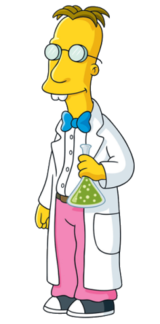 We’ve all had the experience. You’re sitting watching an otherwise entertaining movie or TV show and all of a sudden it happens. The Terrible Science Moment. It could be anything from a discovery to the way a hospital or a lab is presented. Or it could be CSI. The point is that we’ve all experienced that moment where our natural suspension of disbelief is shattered and we’re left with no choice but to change the channel and watch something else. Maybe The Simpsons is on.
We’ve all had the experience. You’re sitting watching an otherwise entertaining movie or TV show and all of a sudden it happens. The Terrible Science Moment. It could be anything from a discovery to the way a hospital or a lab is presented. Or it could be CSI. The point is that we’ve all experienced that moment where our natural suspension of disbelief is shattered and we’re left with no choice but to change the channel and watch something else. Maybe The Simpsons is on.So, what characterizes the best science films? A question that anyone associated with the sciences will answer differently. We all have our own personal things that we’re willing to suspend disbelief for just as we all have our personal views that, when violated by movie science cause us to howl out cries of “I can’t BELIEVE they got it so WROOOOOONG”.
For me, I don’t ask that everything be accurate. Partially because accuracy is rarely if ever dramatic, and partially because I, like many people, live in the real “accurate” world and it is not especially exciting. What I do ask, is that films approach science honestly and with some respect. I can live with dramatic choices as long as science isn’t used as the equivalent of magic. A generic example of the difference…
Film 1. The protagonist has been attacked by the villain with a poison for which there is no known cure. They seek out the eccentric scientist who has an untested potentially lethal cure that she’s been working on for years. The protagonist demands the cure regardless of the risk. The scientist injects him with it and there is a dramatic scene as the protagonist hovers near death and screams and thrashes around a lot. Then he opens his eyes and slowly reaches out a hand to his true love. The cure has worked. He is saved.
Film 2. Same scenario as above. Except now the protagonist rushes to a lab to INVENT the cure. She is seen pouring various oddly colored liquids into oddly shaped plastic tubes until days (or hours) later there is a single test tube of “cure” that is an even stranger color, which she then drinks. The same painful curing scene as above with the same ending.
Film 1 is moderately absurd but within the realm of possibility. I have met many eccentric scientists and I like to think that many of them have strange labs and are working on unusual projects. Film 2 makes me insane. I think the process of discovery is amazing and yet I’m quite certain you would be hard pressed to cure disease with a couple of days in a generic lab with no lab techs and absolutely no testing. Both of these films are ridiculous but at least one acknowledges some reality of science.
 It’s a question of respect and it’s also the difference between a good science film like Gattaca and The Worst Science Film Ever In History… The Core. I don’t know how accurate Gattaca is, but I know it aspires to be realistic and it has a respect for both the process of science and the ethical dilemmas that it creates.
It’s a question of respect and it’s also the difference between a good science film like Gattaca and The Worst Science Film Ever In History… The Core. I don’t know how accurate Gattaca is, but I know it aspires to be realistic and it has a respect for both the process of science and the ethical dilemmas that it creates.  Contrast this with TWSFEIH The Core, where science is like magic… only dumber. I could go on about the differences, but instead I think it’s best to give examples. So tune in next Tuesday to see what I think a good science film looks like and watch me yell, scream and wave my arms over the worst science films I have ever seen. Including TWSFEIH The Core.
Contrast this with TWSFEIH The Core, where science is like magic… only dumber. I could go on about the differences, but instead I think it’s best to give examples. So tune in next Tuesday to see what I think a good science film looks like and watch me yell, scream and wave my arms over the worst science films I have ever seen. Including TWSFEIH The Core.

Hence the (much needed) National Academies initiative to team Scientists with Hollywood in an effort to improve scientific accuracy in the movies.
ReplyDeletehttp://www.scienceandentertainmentexchange.org/.